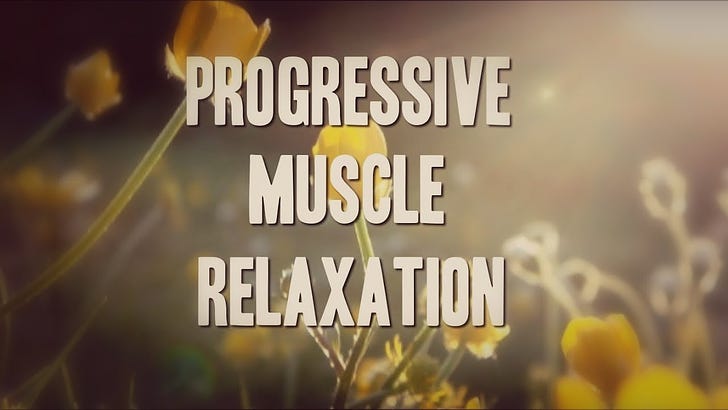How To Do Progressive Muscular Relaxation for Mental Health and Stress Relief
Muscular tension is the number one symptom of stress. Learn to let it go.
Mental health struggles have become ubiquitous in modern society. There is a need to manage the symptoms of stress to prevent disease and optimize health. A simple, free, and accessible method of stress management is Progressive Muscular Relaxation (PMR). This technique can be done anywhere by anyone. It has been studied in scientific research, proving its efficacy on stress, anxiety, and depression (Muhammad Khir et al., 2024). This article will explore the benefits and methods of Progressive Muscular Relaxation and the people to whom this technique would benefit.
The Benefits of Progressive Muscle Relaxation
Progressive Muscular Relaxation has many benefits for mental health. The symptoms of mental distress include overactive thoughts, racing heart, disordered breathing, and thoughts of hopelessness, which can result in a diagnosis of anxiety, depression, bipolar disorder, and more. PMR reduces the symptoms of stress, anxiety, and depression on its own and is more effective when combined with other therapies (Muhammad Khir et al., 2024). It also improves sleep quality (Luo et al., 2024). Dealing with stress effectively through PMR also allows for more resilience to stressors of life, making them easier to handle and keep moving forward (Nair et al., 2024). Additionally, PMR studies show improvement in fatigue, hypertension, dysmenorrhea, and the quality of life for cancer patients (Ghozhdi et al., 2023) (Noefitasari & Trijayanti, 2022) (Sarı et al., 2024) (Toprak et al., 2024) .
The Method of Progressive Muscle Relaxation
Edmund Jacobson is an American physician who created Progressive Muscular Relaxation in the early twentieth century. It is one of the few evidence-based relaxation techniques originating from the United States. Jacobson observed muscle tension as the one common denominator between the symptoms of all his patients. His method seeks to reduce muscle tension to resolve disease symptoms or complete regression of the disease (Seaward, 2025).
The premise of Jacobson's technique combines isometric muscle contraction followed by complete relaxation. The technique has many variations, including timing, intensity, and muscle grouping, but the primary method remains the same. It helps the body interrupt the stress response and encourage relaxation (Seaward, 2025).
How to do Progressive Muscle Relaxation
1. The first step is to create a comfortable position with the body. Practicing PMR by lying in comfortable clothing with optional cushion support under the knees is recommended. Sitting is also an option.
2. The second step combines the breath with muscular contraction. The muscle contracts on the inhale for 5 seconds and is released on the exhale. Ensuring that only one muscle at a time is contracting and using the whole diaphragm to breathe is essential. Variations include starting at the feet or the head.
3. The third step is to consider focus and environmental factors. It does not require an intense internal focus like other styles of meditation. Additionally, a cool, dark, quiet room may help promote relaxation.
Jacobson recommended performing PMR three times per day for 5 minutes. PMR can provide immediate symptomatic relief and longer-term benefits after 4-6 weeks of practice. Progressive Muscular Relaxation is, therefore, an evidence-based stress-relief method that benefits many populations, such as working adults, college students, the elderly, cancer patients, and children (Tapeh et al., 2024) (Tsitsi et al., 2020).
There are many PMR videos on YouTube. Follow along with this video to practice PMR:
References
Ghozhdi, M. K., Ghaljeh, M., & Khazaei, N. (2023). The Effect of Progressive Muscle
Relaxation Technique on Fatigue, Pain and Quality of Life in Dialysis Patients: A Clinical Trial Study. Journal of Evidence-Based Care, 12(4), 7-16. https://doi.org/10.22038/ebcj.2022.65275.2708
Luo, Y., Du, J., Wang, J., Liu, P., Shi, Z., He, Y., Che, G., Huang, K., & Wang, J. (2024). Progressive muscle relaxation alleviates anxiety and improves sleep quality among healthcare practitioners in a mobile cabin hospital: a pre-post comparative study in China. Frontiers in psychology, 15, 1337318. https://doi.org/10.3389/fpsyg.2024.1337318
Muhammad Khir, S., Wan Mohd Yunus, W. M. A., Mahmud, N., Wang, R., Panatik, S. A., Mohd Sukor, M. S., & Nordin, N. A. (2024). Efficacy of Progressive Muscle Relaxation in Adults for Stress, Anxiety, and Depression: A Systematic Review. Psychology research and behavior management, 17, 345–365. https://doi.org/10.2147/PRBM.S437277
Nair, B., Khan, S., Naidoo, N., Jannati, S., Shivani, B., & Banerjee, Y. (2024). Progressive muscle relaxation in pandemic times: bolstering medical student resilience through IPRMP and Gagne's model. Frontiers in psychology, 15, 1240791. https://doi.org/10.3389/fpsyg.2024.1240791
Noefitasari, I., & Trijayanti Idris, D. N. (2022). Reducing Blood Pressure on Elderly with
Hypertension with Progressive Muscle Relaxation Therapy. Jurnal Ners dan Kebidanan, 9(3), 370-378. https://doi.org/10.26699/jnk.v9i3.ART.p370-378
Sarı, E., Gündogdu, F., & Semerci, R. (2024). The Effect of Progressive Muscle Relaxation
Exercises on Sleep Quality in Cancer Patients Undergoing Chemotherapy: A Randomized Controlled Study. Seminars in Oncology Nursing, 40(2), 151620. https://doi.org/10.1016/j.soncn.2024.151620
Seaward, B. L. (2025). Managing Stress: Skills for Anxiety Reduction, Self-Care, and Personal
Resiliency. Jones & Bartlett Learning, LLC.
Tapeh, Z. A., Darvishpour, A., Besharati, F., & Gholami-Chaboki, B. (2024). Effect of
Jacobson's Progressive Muscle Relaxation on Anxiety and Happiness of Older Adults in the Nursing Home. Iranian journal of nursing and midwifery research, 29(1), 78–84. https://doi.org/10.4103/ijnmr.ijnmr_183_22
Toprak Celenay, S., Ozcelikel, G., & Bayrakli, A. (2024). Efficacy of progressive muscle
relaxation technique in primary dysmenorrhea: A randomized controlled trial. Taiwanese Journal of Obstetrics and Gynecology, 63(3), 329-335. https://doi.org/10.1016/j.tjog.2023.10.016
Tsitsi, T., Raftopoulos, V., Papastavrou, E., & Charalambous, A. (2020). Progressive Muscle
Relaxation and guided imagery as techniques to enhance the way of coping of parents of children with malignancies: Findings from a randomized controlled trial. European Journal of Oncology Nursing, 46. https://doi.org/10.1016/j.ejon.2019.101718


